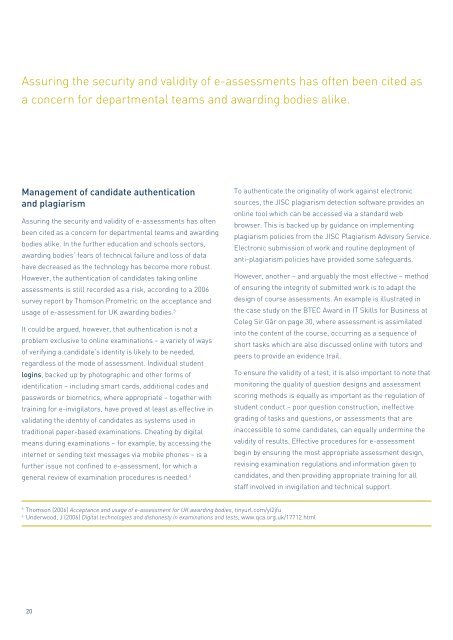Effective Practice with e-Assessment: An overview of ... - Jisc
Effective Practice with e-Assessment: An overview of ... - Jisc
Effective Practice with e-Assessment: An overview of ... - Jisc
Create successful ePaper yourself
Turn your PDF publications into a flip-book with our unique Google optimized e-Paper software.
Assuring the security and validity <strong>of</strong> e-assessments has <strong>of</strong>ten been cited as<br />
a concern for departmental teams and awarding bodies alike.<br />
Management <strong>of</strong> candidate authentication<br />
and plagiarism<br />
Assuring the security and validity <strong>of</strong> e-assessments has <strong>of</strong>ten<br />
been cited as a concern for departmental teams and awarding<br />
bodies alike. In the further education and schools sectors,<br />
awarding bodies’ fears <strong>of</strong> technical failure and loss <strong>of</strong> data<br />
have decreased as the technology has become more robust.<br />
However, the authentication <strong>of</strong> candidates taking online<br />
assessments is still recorded as a risk, according to a 2006<br />
survey report by Thomson Prometric on the acceptance and<br />
usage <strong>of</strong> e-assessment for UK awarding bodies. 5<br />
It could be argued, however, that authentication is not a<br />
problem exclusive to online examinations – a variety <strong>of</strong> ways<br />
<strong>of</strong> verifying a candidate’s identity is likely to be needed,<br />
regardless <strong>of</strong> the mode <strong>of</strong> assessment. Individual student<br />
logins, backed up by photographic and other forms <strong>of</strong><br />
identification – including smart cards, additional codes and<br />
passwords or biometrics, where appropriate – together <strong>with</strong><br />
training for e-invigilators, have proved at least as effective in<br />
validating the identity <strong>of</strong> candidates as systems used in<br />
traditional paper-based examinations. Cheating by digital<br />
means during examinations – for example, by accessing the<br />
internet or sending text messages via mobile phones – is a<br />
further issue not confined to e-assessment, for which a<br />
general review <strong>of</strong> examination procedures is needed. 6<br />
To authenticate the originality <strong>of</strong> work against electronic<br />
sources, the JISC plagiarism detection s<strong>of</strong>tware provides an<br />
online tool which can be accessed via a standard web<br />
browser. This is backed up by guidance on implementing<br />
plagiarism policies from the JISC Plagiarism Advisory Service.<br />
Electronic submission <strong>of</strong> work and routine deployment <strong>of</strong><br />
anti-plagiarism policies have provided some safeguards.<br />
However, another – and arguably the most effective – method<br />
<strong>of</strong> ensuring the integrity <strong>of</strong> submitted work is to adapt the<br />
design <strong>of</strong> course assessments. <strong>An</strong> example is illustrated in<br />
the case study on the BTEC Award in IT Skills for Business at<br />
Coleg Sir Gâr on page 30, where assessment is assimilated<br />
into the content <strong>of</strong> the course, occurring as a sequence <strong>of</strong><br />
short tasks which are also discussed online <strong>with</strong> tutors and<br />
peers to provide an evidence trail.<br />
To ensure the validity <strong>of</strong> a test, it is also important to note that<br />
monitoring the quality <strong>of</strong> question designs and assessment<br />
scoring methods is equally as important as the regulation <strong>of</strong><br />
student conduct – poor question construction, ineffective<br />
grading <strong>of</strong> tasks and questions, or assessments that are<br />
inaccessible to some candidates, can equally undermine the<br />
validity <strong>of</strong> results. <strong>Effective</strong> procedures for e-assessment<br />
begin by ensuring the most appropriate assessment design,<br />
revising examination regulations and information given to<br />
candidates, and then providing appropriate training for all<br />
staff involved in invigilation and technical support.<br />
5<br />
Thomson (2006) Acceptance and usage <strong>of</strong> e-assessment for UK awarding bodies, tinyurl.com/yl2jfu<br />
6<br />
Underwood, J (2006) Digital technologies and dishonesty in examinations and tests, www.qca.org.uk/17712.html<br />
20
















